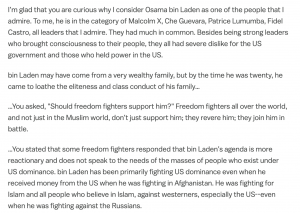Asians – and in particular Asian women – are generally excluded from the American political sphere due to both a cultural inclination to look inwardly to their so-called immigrant or ethnic enclaves and a silencing of – or sheer lack of – Asian voices in the US government. Yuri Kochiyama – an American woman born to Japanese immigrants – broke that mold by involving herself as an activist in her youth, most notably after she and her father were wrongly accused and detained in the wake of the Pearl Harbor attack. During her time in a Japanese internment camp detained with other Japanese Americans, she gained a sense of racial pride under the yoke of racial injustices. After starting a family and moving to New York City, she remained incredibly active and involved, advocating for integrated education for underprivileged, inner-city children and employment for black and Puerto Rican workers in NYC, and even going to prison for her role in protests. It wasn’t until 1963 when she met Malcolm X at a courthouse, however, when she fully involved herself with the Black Power and black nationalist movements in Harlem, quickly becoming a force of radical activism and leading efforts against wrongful incarceration of political prisoners and anti-US imperialism, among many other issues. She was a great woman, by many accounts, and even served as a bridge “between the Black and Asian movements and between East and West Coast activists,” and formed a unique iteration of contemporary color consciousness in the US. Despite her incredible body of work, her legacy is quite controversial, especially given her vocal support of individuals like Osama bin Laden, Che Guevara, Patrice Lumumba, and Fidel Castro.
I chose to do this archive because it represents the work and narrative of a very unique individual in a very unique context: an Asian American woman who was widely recognized and praised for her activism on both the black and Asian American liberation fronts. Despite her contentious legacy, Yuri Kochiyama was an incredible female activist who dismantled many stereotypes by being the face of a momentous radical, anti-imperial, anti-capitalist, black liberation movement.
I chose the first artifact because it first captures Kochiyama in her natural environment as an activist and a leader. The one photo does a lot to capture her essence: her facial expression, posture, and body language all work together to depict her tirelessness and fearlessness in fighting racial injustice and imperialism. This is also a significant photo considering the sheer lack of Asian American voices and faces in American history, especially on the civil rights front.

Yuri Kochiyama speaks at an anti-war demonstration in New York City’s Central Park around 1968 (Caption and photo provided by the Zinn Education Project)
I chose this second artifact – a video interview of Kochiyama speaking about meeting Malcolm X – because it represents a significant moment in her political career. Upon meeting Malcolm, they quickly formed a friendship and she thrust herself behind his movement for black liberation, a significant moment of color consciousness and alliance beyond color lines in the US. She would even be present at his assassination two years later, cradling his head.
Yuri Kochiyama describes the moment she met Malcolm X (Densho Encyclopedia)
The final artifact is an excerpt from many years later: a 2003 interview for the Objector: A Magazine of Conscience and Resistance in which Kochiyama defended Osama bin Laden, a move that surprised many and angered even more. Despite the fact that she was an incredibly vocal opponent of American imperialism, people were stunned by the idea that these “loathsome figures” could be admired or respected. She praised him for his self-awareness and his effectiveness in combating American empire at whatever the cost.
Yuri Kochiyama explains why she respects Osama bin Laden (Vox.com article)
In conclusion, I sought to utilize my online archive as one that captured Yuri Kochiyama’s initial activist efforts, then highlighted a significant shift in her political career and outlook through a chance encounter with Malcolm X, and finally ended with a quote that demonstrated how radical her ideologies were.
Sources:
(1) https://www.vox.com/2016/5/19/11713686/yuri-kochiyama
(2) https://www.zinnedproject.org/news/tdih/yuri-kochiyama-was-born/
(3) https://www.blackpast.org/african-american-history/kochiyama-yuri-1921/
(4) https://encyclopedia.densho.org/Yuri_Kochiyama/#cite_ref-ftnt_ref3_3-0

Leave a Reply